LI Network
Published on: January 9, 2024 at 13:33 IST
The Kerala High Court, in a recent pronouncement, unequivocally stated that allegations of fraud, undue influence, and coercion must not be made in a general manner based solely on suspicion or conjecture to dispute the authenticity of a Will.
Justice K. Babu, presiding over a Single Judge Bench, highlighted that suspicion about an isolated factor cannot serve as a basis to question the genuineness of a Will.
Referring to Rule 4 of Order 6 of the Code of Civil Procedure (CPC), the Court underscored that a party alleging misrepresentation, fraud, undue influence, etc., needs to provide specific details in the complaint.
Furthermore, the Court emphasized that a substantial amount of evidence is necessary to establish such claims.
The Court stated, “Fraud, like any other charge of a criminal offense, whether made in civil or criminal proceedings, must be established beyond reasonable doubt, and a finding as to fraud cannot be based on suspicion or conjecture.” It further clarified that vague and sweeping allegations, even if assertively worded, without specific pleadings are insufficient for the court to act upon.
The judgment addressed an appeal challenging the legitimacy of a Will executed by Late Valiyammal, appointing the 1st plaintiff as the executor.
The defendants contested the Will, alleging undue influence, fraud, and the absence of Valiyammal’s signature.
They argued that it was unnatural for Valiyammal to solely allocate properties to the plaintiffs and questioned her mental fitness at the time of executing the Will.
The Court at the lower level affirmed the existence, execution, and validity of the Will, leading to the appeal by the 3rd defendant.
The appellant contended that the plaintiffs failed to prove the Will’s due execution under Section 63(c) of the Indian Succession Act, 1925, and Section 68 of the Indian Evidence Act.
The Court, referring to Section 63 and Section 68, noted that in the absence of suspicious circumstances, proof of testamentary capacity and the testator’s signature satisfies the onus on the propounder. However, if suspicious circumstances arise, the propounder must explain them to the court’s satisfaction.
Addressing the ‘suspicious circumstances’ raised by the appellant, such as the exclusion of natural heirs and the 1st plaintiff’s involvement, the court found them normal and not sufficient to prove fraud, undue influence, or coercion.
The Court dismissed the appeal, emphasizing that the failure to prove such allegations meant the suspicions lacked merit.
The case is titled “Premakumari R. v. O.K. Sivasankara Pillai & Ors.”

